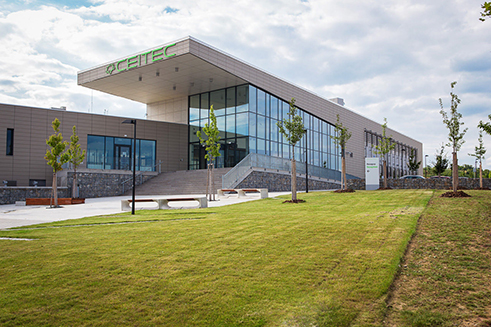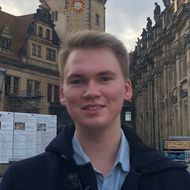‘Recognition of Our Work Motivates Us to Continue Our Research’

A report by students of MIEM has won a prestigious prize at the 44th International Conference on Telecommunications and Signal Processing organized by Brno University of Technology in the Czech Republic. The project by the HSE students was named the best student work by the organizing committee.
The conference took place at the end of July and was held online due to COVID-19 restrictions. Among the participants were HSE MIEM students Nikolay Stepanov, Albert Veprev and Aleksandra Sharapova (academic supervisor Aleksandr Ometov), whose report won the Best Student Paper Award.
Brno University of Technology (Czech Republic) is the main organizer of the conference, which was first held in 1977 and went international in 1980. The conference is currently run in cooperation with 18 universities from all over the world. This year, researchers from more than 30 countries took part in the event.
The students from HSE MIEM presented a paper called ‘On Machine Learning Applicability to Transaction Time Prediction for Time-Critical C-ITS Applications.’ The research was also co-authored by Mikhail Komarov (Professor of the HSE Graduate School of Business Department of Business Informatics), Darya Alekseeva (PhD student, Tampere University, Finland), Elena Simona Lohan (Professor, Tampere University, Finland) and Aleksandr Ometov (post-doc, Tampere University, Finland).
The paper presents a method for optimizing transactions in C-ITS (Cooperative Intelligent Transport Systems) networks using machine learning. It presents machine-learning models for predicting transaction times and examines several algorithms for solving two types of tasks: classification and regression. The algorithms make it possible to calculate the parameters of the intelligent transport system and the environmental factors affecting it, as well as to optimize the system in order to make data transfer faster and more reliable. The algorithms developed can enable vehicles to automatically select the optimal channel for data transfer and, for example, send messages about emergencies on the roads more quickly, thereby improving traffic safety.
The conference materials have been published in a collection available on all major reference databases (Scopus, DBLP, Google Scholar, the IEEE Xplore digital library).

Aleksandr Ometov, Academic Supervisor, post-doc at Tampere University
It’s good to see talented young specialists from Russia taking part in the conference not as audience members, but presenting their own work and earning recognition from the international community. The students of MIEM have made their teachers proud!

Nikolay Stepanov, 4th-year student of MIEM
Winning the Best Student Paper Award was very unexpected for us—the conference featured presentations of a lot of strong student works, mostly done by doctoral students. Such high recognition of our work motivates us to continue our research and obtain good results. I would also like to thank Aleksandr Ometov, our academic advisor, whose expertise and support helped us to achieve such high-quality results.

Aleksandra Sharapova, 4th-year MIEM student
The interdisciplinary nature of project work at MIEM allowed us to put together a group of students from different fields. Our skills complemented each other well and helped us to conduct research that combines the fields of machine learning and telecommunications. Working on an interdisciplinary project allowed us to hone the skills we’ve learned in our studies and gain new knowledge from adjacent fields.

Albert Veprev, 4th-year MIEM student
Taking part in the conference allowed us to present the results of our research at the international level and discuss its future development with leading world researchers. It was very interesting to participate in an event of this level and to learn more about the latest developments in wireless networks first-hand. Unfortunately, due to COVID-19 restrictions, the conference was held online, but we will continue our research and plan to present new results in person in the future.
See also:
‘The Goal of the Spring into ML School Is to Unite Young Scientists Engaged in Mathematics of AI’
The AI and Digital Science Institute at the HSE Faculty of Computer Science and Innopolis University organised a week-long programme for students, doctoral students, and young scientists on the application of mathematics in machine learning and artificial intelligence. Fifty participants of Spring into ML attended 24 lectures on machine learning, took part in specific pitch sessions, and completed two mini-courses on diffusion models—a developing area of AI for data generation.
Software for Rapid Detection of Dyslexia Developed in Russia
HSE scientists have developed a software tool for assessing the presence and degree of dyslexia in school students based on their gender, age, school grade, and eye-tracking data. The application is expected to be introduced into clinical practice in 2024. The underlying studies were conducted by specialists in machine learning and neurolinguistics at the HSE AI Research Centre.
‘Every Article on NeurIPS Is Considered a Significant Result’
Staff members of the HSE Faculty of Computer Science will present 12 of their works at the 37th Conference and Workshop on Neural Information Processing Systems (NeurIPS), one of the most significant events in the field of artificial intelligence and machine learning. This year it will be held on December 10–16 in New Orleans (USA).
HSE University Holds HSE Sber ML Hack
On November 17-19, The HSE Faculty of Computer Science, SBER and cloud technology provider Cloud.ru organised HSE Sber ML Hack, a hackathon based around machine learning. More than 350 undergraduate and graduate students from 54 leading Russian universities took part in the competition.
HSE University Hosts Fall into ML 2023 Conference on Machine Learning
Over three days, more than 300 conference participants attended workshops, seminars, sections and a poster session. During panel discussions, experts deliberated on the regulation of artificial intelligence (AI) technologies and considered collaborative initiatives between academic institutions and industry to advance AI development through megaprojects.
HSE University to Host ‘Fall into ML 2023’ Machine Learning Conference
Machine Learning (ML) is a field of AI that examines methods and algorithms that enable computers to learn based on experience and data and without explicit programming. With its help, AI can analyse data, recall information, build forecasts, and give recommendations. Machine learning algorithms have applications in medicine, stock trading, robotics, drone control and other fields.
New Labs to Open at Faculty of Computer Science
Based on the results of a project competition, two new laboratories are opening at HSE University’s Faculty of Computer Science. The Laboratory for Matrix and Tensor Methods in Machine Learning will be headed by Maxim Rakhuba, Associate Professor at the Big Data and Information Retrieval School. The Laboratory for Cloud and Mobile Technologies will be headed by Dmitry Alexandrov, Professor at the School of Software Engineering.
Joint Project of Scientists from HSE University and Surgut State University to Help Prevent Recurrent Heart Attacks and Strokes
One of the winning projects of a competition held by HSE University’s Mirror Laboratories last June focuses on the use of machine learning technologies to predict the outcomes of acute coronary syndrome. It is implemented by HSE University’s International Laboratory of Bioinformatics together with the Research and Educational Centre of the Medical Institute at Surgut State University. Maria Poptsova, Head of the International Laboratory of Bioinformatics and Associate Professor at HSE University’s Faculty of Computer Science, talks about how this joint project originated, how it will help patients, and how work to implement it will be organised.
‘Interest in the Application of Machine Learning in Bioinformatics Is Growing by the Year’
On August 28–30, HSE University’s Faculty of Computer Science held the 4th Summer School on Machine Learning in Bioinformatics. This year, 670 people registered for the event, and over 300 visited in person. The programme included lectures and seminars on various spheres of bioinformatics: applied bioinformatics and the bioinformatics of DNA, RNA, and proteins; elementary genomics; modern methods of data analysis and molecular biology. The lectures were complemented by practical tasks aimed at different levels of knowledge.
Fall into ML 2023: HSE University’s Faculty of Computer Science Organises Conference on Machine Learning
On October 26–28, HSE University’s Institute of Artificial Intelligence and Digital Sciences at the Faculty of Computer Science will hold a conference titled Fall into ML 2023 withsupport from the HSE University AI Research Centre . The event is dedicated to promising directions of fundamental AI development.


